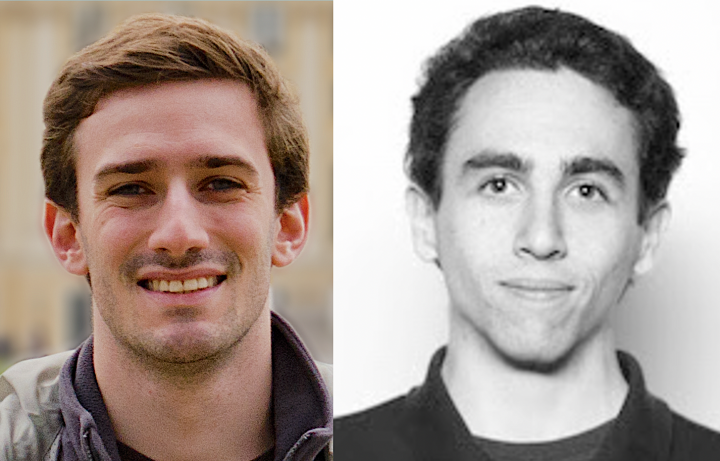New Postdocs Bring Expertise in Secure Software Development and Usable Security and Privacy
Ethan Cecchetti (left in photo) and Nathan Malkin (right)—both of whom recently received doctorates in computer science from Cornell University and UC Berkeley, respectively—will start at the Maryland Cybersecurity Center (MC2) in September.
Cecchetti will be working primarily with Michael Hicks, a professor of computer science with joint appointments in MC2 and the University of Maryland Institute for Advanced Computer Studies (UMIACS).
Cecchetti’s research focuses on designing secure software systems and building tools to ease their development. He is the second recipient of the MC2 postdoctoral fellowship, established last year to attract highly-motivated candidates to UMD to conduct research and scholarship.
The fellowship offers two years of financial support and the opportunity to collaborate with numerous UMD faculty and students.
“Ethan is a world-class expert in information security, bringing skills in theory, cryptography, programming languages and systems,” Hicks says. “Building software systems to be secure is a longstanding but pressing challenge. I'm looking forward to working with Ethan on meeting that challenge head on.”
Cecchetti, who was a 2017 recipient of a National Defense Science and Engineering Graduate Fellowship through the U.S. Department of Defense, says he is excited about working with Hicks and other researchers in MC2.
“My Ph.D. research focused on tools and techniques for building secure software, and I want to expand those tools to encompass more real-world systems and be more usable by developers,” he says. “Joining MC2 gives me the opportunity to easily collaborate with faculty who care deeply about security and specialize in programming languages, distributed systems, applied cryptography and usability. This combination makes it the perfect place for my work moving forward.”
Malkin’s research focuses on usable security and privacy, such as understanding privacy requirements for smart speakers and televisions. He also draws on behavioral economics to help users make security decisions while avoiding cognitive biases.
Michelle Mazurek, an associate professor of computer science and director of MC2, will be working with Malkin.
“We're very lucky to have hired Nathan, who brings strong expertise in human-centered security and privacy, including work on IoT [Internet of Things] privacy and people's security decision-making,” says Mazurek, who also holds an appointment in UMIACS. “I'm looking forward to working with him on projects including thinking about IoT privacy with a broad array of stakeholders, as well as security and privacy needs for high-risk user populations.”
Malkin, who was a member of the Berkeley Laboratory for Usable and Experimental Security and affiliated with Berkeley’s Center for Long-Term Cybersecurity, says he is excited to relocate to the University of Maryland because of its great researchers.
“I'm looking forward to the opportunity to collaborate with folks across the university, including at the College of Information Studies, in the Human-Computer Interaction Lab, and of course at MC2,” he says. “As a member of Michelle’s SP2 [Security, Privacy, People] Lab, I hope to continue my research into privacy for the Internet of Things, as well contribute to projects to help developers create more secure software and understand the privacy needs of understudied populations.
The Department welcomes comments, suggestions and corrections. Send email to editor [-at-] cs [dot] umd [dot] edu.
